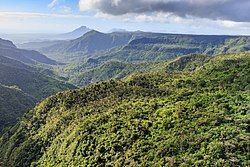Rivière Noire (Mauritian Creole pronunciation: [ʁivjɛː nwɑː]) or Black River ([blak ɹivə]) is a district on the western side of the island of Mauritius. Rivière Noire translates to Black River. This region receives less rainfall than the others. The district has an area of 259 square kilometres (100 sq mi) and the population was estimated to be 80,939 as of 31 December 2015.[2] It is the third largest district of Mauritius in area, but the smallest in terms of population. The district is mostly rural, but it also include the western part of the city of Port Louis and western part of Quatre Bornes.[3]
Black River
Rivière Noire | |
|---|---|
 Black River Gorges | |
 Map of Mauritius island with Black River District highlighted | |
| Coordinates: 20°20′S 57°25′E / 20.333°S 57.417°E | |
| Country | |
| Government | |
| • Type | District Council |
| • Chairman | Mr. Chetty Noël Doget Oxsinice |
| • Vice Chairman | Mrs. Papeche Nicole Marie Anne |
| Area | |
• Total | 259 km2 (100 sq mi) |
| Population (2015)[2] | |
• Total | 80,939 |
| • Density | 310/km2 (810/sq mi) |
| Time zone | UTC+4 (MUT) |
Places of interest
editThis section needs expansion. You can help by adding to it. (July 2012) |
Famous areas include Tamarin Falls and the Chamarel coloured earth. The name Black River derives from the fact that it is the driest district of the island. Flic en Flac is one of the most beautiful beaches on the island, and the longest. It is known for its natural beauty.
Mission Blue Hope Spot
editIn 2019, Mauritius recognised one of its new Hope Spots, the Black River District Hope Spot, in support of unifying the local marine conservation community.[4]
Hope Spots were pioneered by Dr. Sylvia Alice Earle, an American marine biologist, oceanographer, explorer, author, and lecturer. Earle is part of the group Ocean Elders, which is dedicated to protecting the ocean and its wildlife.[5]
The Hope Spot represents a commitment to protecting and caring for a culturally important and biodiverse region like the coastal region of Black River in Mauritius. Hope Spots are ecologically unique areas of the ocean designated for protection under a global conservation campaign. An Actionable Plan to Save the Earth's Oceans is overseen by Mission Blue (Sylvia Earle) a non-profit organization founded by Sylvia Earle per her 2009 TED prize wish.[6]
Places
editThe Rivière Noire District includes different regions; however, some regions are further divided into different suburbs.[2][3]
- Albion
- Bambous
- Cascavelle (Eastern part in Plaines Wilhems District)
- Case Noyale
- Chamarel (Eastern part in Savanne District)
- Flic-en-Flac
- Grande-Rivière-Noire
- Gros-Cailloux
- La Gaulette
- Le Morne
- Petite-Rivière
- Port Louis (West)
- Quatre Bornes (West)
- Richelieu
- Tamarin
Education
editThis section needs expansion. You can help by adding to it. (May 2015) |
Schools:
- École maternelle et primaire Paul et Virginie, a French international school, is in Tamarin.[7][8]
- La Gaulette State Secondary School, a state school providing co-education in La Gaulette Village
See also
editReferences
edit- ^ "Archived copy". Archived from the original on 4 April 2014. Retrieved 8 March 2014.
{{cite web}}: CS1 maint: archived copy as title (link) - ^ a b c Ministry of Finance & Economic Development (2016). "ANNUAL DIGEST OF STATISTICS 2015" (PDF). August. Government of Mauritius: 19. Retrieved 23 December 2016.
{{cite journal}}: Cite journal requires|journal=(help) - ^ a b Statistic office of Mauritius (2011). "Housing and population Census 2011" (PDF). Housing and population Census 2011. Government of Mauritius. Archived from the original (PDF) on 21 October 2013. Retrieved 29 July 2012.
- ^ MAURITIUS RECOGNIZED AS NEW HOPE SPOT IN SUPPORT OF UNIFYING LOCAL MARINE CONSERVATION COMMUNITY. 2021.
The Coastal Waters of the Black River District have been named a Hope Spot by international marine conservation nonprofit Mission Blue in support of bringing together Mauritius' marine conservation community over the shared value of creating a healthy marine ecosystem that will last indefinitely.
- ^ "About Us". Ocean Elders. 2 December 2016. Retrieved 1 February 2024.
- ^ "Sylvia Earle imagines ocean "Hope Spots"". www.ted.com. Retrieved 6 April 2017.
- ^ "École maternelle et primaire Paul et Virginie." AEFE. Retrieved on May 4, 2015. "Adresse Route royale, 90901 Tamarin Ville: Tamarin Pays: Maurice"
- ^ "Accueil." École maternelle et primaire Paul et Virginie. Retrieved on May 4, 2015.